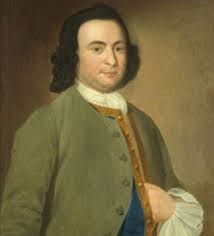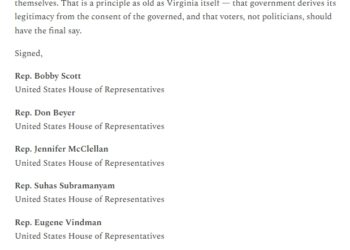 The Virginia Convention of Delegates UNANIMOUSLY adopted the Virginia Declaration of Rights, drafted in March of 1776 by George Mason, with some assistance on the portion on religious freedom by James Madison. It was later included in Article I of the Virginia Constitution, a modified version of which is in the current Virginia Constitution (drafted largely) by A. E. Dick Howard in 1971), which means it is still in effect.
The Virginia Convention of Delegates UNANIMOUSLY adopted the Virginia Declaration of Rights, drafted in March of 1776 by George Mason, with some assistance on the portion on religious freedom by James Madison. It was later included in Article I of the Virginia Constitution, a modified version of which is in the current Virginia Constitution (drafted largely) by A. E. Dick Howard in 1971), which means it is still in effect.
Mason, a Founding Father who should be better known, later refused to sign the draft Constitution at the Philadelphia Convention, in part because it allowed the continuation of slavery, but also because it lacked a similar protection of rights against the power of the Federal government. The document adopted this day influenced both our Declaration of Independence and the drafting of our national Bill of Rights.
Please allow this teacher of government to high school students to explore the document with you.
The complete text of the Virginia Declaration of Rights is readily available online – that hotlink will take you to the version of the Avalon Project at Yale. I will mention that Mason was not the only one thinking this way – Pennsylvania’s 1776 Constitution would begin with a Bill of Rights. But Mason’s language had a huge impact, because we see it strongly reflected in the work of Jefferson in the drafting of the Declaration of Independence.
A little background on Mason, before getting into the document. Unlike his contemporaries in Virginia, he did not actively seek public office, and had to be prevailed upon to take the seat in the legislature previously held by George Washington. Later at the Constitutional Convention, where he was one of three attendees who refused to sign the document produced, he was an active participant, but his opposition made him unpopular, and led to George Washington referring to him as his “former friend.” Nevertheless his defense of individual liberties seemed to resonate throughout the new nation, and in the First Congress Madison took up the responsibility of drafting what we now know as our Bill of Rights.
Mason did not write in isolation or de novo: the British, who may still lack a written constitution, nevertheless had drafted a Bill of Rights during their dispute with James II, support of which was a requirement for William and Mary of Orange to be offered the throne. That document looked back to things like the Petition of Right of 1628 which had been at least temporarily agreed to by Charles I, and which asserted the rights of Parliament and the people and restricted the power of the King, and Magna Carta, signed on to under possible threat of war by his barons by King John in June of 1215, to which we trace even today some of our most important protections.
Let me note that as a teacher it amazes me that Americans do not realize that our Declaration was not written as something totally new – it comes from a tradition of limiting the power of the King tracing back over 560 years, including deposing two different (Stuart) Kings. Remember, the founding generation started by wishing to assert their rights as Englishmen.
Now to the document itself.
I That all men are by nature equally free and independent, and have certain inherent rights, of which, when they enter into a state of society, they cannot, by any compact, deprive or divest their posterity; namely, the enjoyment of life and liberty, with the means of acquiring and possessing property, and pursuing and obtaining happiness and safety.
Here we see language derived clearly from Locke – life, liberty and property – and yet also the words associated with Jefferson – pursuing happiness. Mason say rights are inherent, Jefferson unalienable, but the parallel is clear.
II That all power is vested in, and consequently derived from, the people; that magistrates are their trustees and servants, and at all times amenable to them.
A clear statement of the idea of popular sovereignty, reflected again in the Preamble of the Constitution, which could properly be phrased as We the people of the United States … do ordain and establish this Constitution for the United States of America.
III That government is, or ought to be, instituted for the common benefit, protection, and security of the people, nation or community; of all the various modes and forms of government that is best, which is capable of producing the greatest degree of happiness and safety and is most effectually secured against the danger of maladministration; and that, whenever any government shall be found inadequate or contrary to these purposes, a majority of the community hath an indubitable, unalienable, and indefeasible right to reform, alter or abolish it, in such manner as shall be judged most conducive to the public weal.
Here we see asserted what Jefferson offers in the Declaration, that the people have the right to alter or abolish any government which does not meet the needs of the people: government is, as one can clearly trace through the thinking of Locke, a product of the people and subject to their will.
In the next three articles, Mason asserts that offices ought not to be hereditary (and I wonder what he might think of children succeeding their parents in office largely by name), that there be separation of powers with limits on periods of service (saying of officials “they should, at fixed periods, be reduced to a private station, return into that body from which they were originally taken”) and that people have a right to vote and should not be taxed or deprived of property without the consent implied by voting for those making such decisions.
VII That all power of suspending laws, or the execution of laws, by any authority without consent of the representatives of the people is injurious to their rights and ought not to be exercised.
We see this reflected in the Constituion which its restrictions on suspension of habeas corpus. By implication, this would reject the notion of a unitary executive acting as commander in chief even in the time of war – note the importance of consent of the representatives of the people – were Congress only to have remembered that during the 8 years 2001-2009!
Articles VIII through XIV should be very familiar to anyone who has ever read our national Bill of Rights:
VIII That in all capital or criminal prosecutions a man hath a right to demand the cause and nature of his accusation to be confronted with the accusers and witnesses, to call for evidence in his favor, and to a speedy trial by an impartial jury of his vicinage, without whose unanimous consent he cannot be found guilty, nor can he be compelled to give evidence against himself; that no man be deprived of his liberty except by the law of the land or the judgement of his peers.
IX That excessive bail ought not to be required, nor excessive fines imposed; nor cruel and unusual punishments inflicted.
X That general warrants, whereby any officer or messenger may be commanded to search suspected places without evidence of a fact committed, or to seize any person or persons not named, or whose offense is not particularly described and supported by evidence, are grievous and oppressive and ought not to be granted.
XI That in controversies respecting property and in suits between man and man, the ancient trial by jury is preferable to any other and ought to be held sacred.
XII That the freedom of the press is one of the greatest bulwarks of liberty and can never be restrained but by despotic governments.
XIII That a well regulated militia, composed of the body of the people, trained to arms, is the proper, natural, and safe defense of a free state; that standing armies, in time of peace, should be avoided as dangerous to liberty; and that, in all cases, the military should be under strict subordination to, and be governed by, the civil power.
XIV That the people have a right to uniform government; and therefore, that no government separate from, or independent of, the government of Virginia, ought to be erected or established within the limits thereof.
Let me skip ahead to the final article, on religion:
XVI That religion, or the duty which we owe to our Creator and the manner of discharging it, can be directed by reason and conviction, not by force or violence; and therefore, all men are equally entitled to the free exercise of religion, according to the dictates of conscience; and that it is the mutual duty of all to practice Christian forbearance, love, and charity towards each other.
Mason was a clear supporter of free exercise. It is appropriate to note the lack of clear statement on establishment: after all, Virginia did have an established church. Remember that these words were influenced by the young James Madison, and were written before Jefferson’s Virginia Statute of Religious Freedom (for which Madison was the primary force in getting through the state legislature when Jefferson was in France). Some might object to the use of the language about “Christian forebearance” thinking it too narrow. I would respond that one might better think of this as Mason reminding people that his understanding of Christianity imposed a duty upon its adherents to a generosity of spirit.
The penultimate article reads like this:
XV That no free government, or the blessings of liberty, can be preserved to any people but by a firm adherence to justice, moderation, temperance, frugality, and virtue and by frequent recurrence to fundamental principles.
I suppose that people of a variety of persuasion might want to rely upon these words to support position not dissimilar from those who intepret the Constitution by “original intent” or those who would argue that much of the jurisprudence that advanced the power of the federal government through programs such as those of the Progressive Era, the New Deal, and the Great Society ought to be rolled back. I would be cautious in such an approach – remember that Mason wanted to end slavery. It would be fair to say that Mason would support the idea of questioning expansion of national government power to ensure that it did not infringe on the rights of the people, remembering that they are ultimately the sovereigns. Note that the first of the five concepts to which he refers is justice. And it is here I want to make a bit of an exploration.
I think the concept of justice is one upon which we ought to require much reflection. Let me bold some words in our founding documents. In the Declaration Jefferson writes
We hold these truths to be self-evident, that all men are created equal, that they are endowed by their Creator with certain unalienable rights, that among these are life, liberty and the pursuit of happiness. That to secure these rights, governments are instituted among men, deriving their just powers from the consent of the governed.
and the Preamble reads
We the People of the United States, in Order to form a more perfect Union, establish Justice, insure domestic Tranquility, provide for the common defence, promote the general Welfare, and secure the Blessings of Liberty to ourselves and our Posterity, do ordain and establish this Constitution for the United States of America
Following the thinking of Locke, Mason is, I would argue, a proponent of the idea that Justice is not an absolute, but rather a core principle agreed to in the process of the formation of the social contract that leads to the establishment of government. In that sense Justice is what we are willing to tolerate, how we agree to limit ourselves in order to get along. It is also why it is important that government remember that Mason also relies on concepts such s moderation and temperance.
I grew up not learning about Mason or about the Virginia Declaration. Years later I started dating a young woman who was taking a year off between high school and college. She was then 17, and the year before on her own had written an extensive paper on George Mason, precisely because of his penning of the Virginia Declaration of Rights.
As Leaves on the Current now heads out for an event at Jefferson’s Monticello, I could not finish this posting without acknowledging that it was her appreciation of Mason that enabled me to realize his importance, and the importance of the document adopted 234 years ago today, in the development of the system of government under which we should today still be operating.
So I thank Mason. I thank Leaves for teaching me about him. I pay that forward to my students. And if you don’t mind, on this 234th anniversary, I thought it appropriate to offer these words to you.
Peace.

![[UPDATED with Official Announcement] Audio: VA Del. Dan Helmer Says He’s Running for Congress in the Newly Drawn VA07, Has “the endorsement of 40 [House of Delegates] colleagues”](https://bluevirginia.us/wp-content/uploads/2026/02/helmermontage.jpg)
















